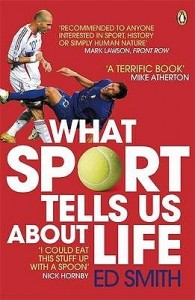 As well as The Chinese Garden of Serenity, Vishy also sent me What Sport Tells Us About Life.
As well as The Chinese Garden of Serenity, Vishy also sent me What Sport Tells Us About Life.
Again, it was a thoughtful gift. Although I don’t tend to write about sport on here, I’ve always enjoyed watching cricket, and Vishy and I have talked about it quite a bit by email. The author of this book, Ed Smith, even batted for my county, Kent, so it was bound to go down well.
First of all, I should say that I think the cover does the book a disservice. With its lurid colours and headbutting image, it looks like the kind of book you see in the shops before Christmas, a lightweight, sensationalist cash-in for the sport-lover in your life.
The book is actually a lot more serious and thoughtful than its cover suggests. Ed Smith takes on a series of interesting subjects from sport, such as the role of chance, the true nature of cheating and the appeal of nostalgia, and examines what they tell us about sport and life.
There are 15 essays altogether, with some links between them but no overall thesis. Although Smith is an ex-cricketer, he draws on a variety of sports to illustrate his points. Cricket features heavily, but doesn’t dominate.

I particularly enjoyed the chapter on amateurism vs. professionalism. The amateur spirit used to be admired and cherished, but now professionalism dominates, not just in sport but in other areas of life. ‘Amateur’ has come to mean bumbling and incompetent, while professionalism stands for efficiency.
Smith does a good job of showing the value of the amateur spirit, and why we would do well to preserve something of it in this professional age. Amateurs played for the love of the game, as the word’s etymology suggests. There was more room for creativity and inspiration, with players freed from the burden of too much coaching and analysis. There’s an excellent quote from Brazilian football manager Felipe Scolari:
It is a fact that the more important something gets, the harder it is to do it well. We can all walk along a kerbstone in safety: but if the drop were not six inches but six miles, how then would we walk?
This is a great observation, and one I relate to in my own life. When I’m writing for the love of writing, I’m at my best. When I’m thinking about the six-mile drop (bad reviews, rejections, humiliation, the need to make money), I lose my balance. I think the kerbstone analogy applies to many areas of life, don’t you?
Some of the essays are not so much what sport tells us about life, and more what sport tells us about sport. It was hard to see much wider significance to life, for example, in the discussion of legendary cricketer Don Bradman and why we’ll never see his like again. It was a fascinating essay, but more for its discussion of the sport itself than for exploring wider implications. The same goes for a few of the essays.
In general, though, this is an interesting, thoughtful book, with plenty of observations that have wider resonance beyond the field of play. You don’t have to be sport fan to enjoy it, but it would probably help.




There are 10 comments
Beautiful review, Andrew! So glad to know that you liked Ed Smith’s book. He is one of my favourite writers on sport and I liked all the essays in this book. Nice to know that you liked that essay on amateurism vs professionalism. That was one of my favourites too. I loved that Felipe Scolari quote. It is so true. Thanks for sharing. I agree with you that some of the essays in the book were more about sport than about life. Sorry about that cover 🙂
Thanks for this beautiful review, Andrew.
He is an excellent writer, Vishy. A lot of sport writing gets caught up in what’s happening right now, who’s winning and who’s losing, and I like anyone who can step outside all that and see the bigger picture. Thanks again for sending it to me!
The cover was not a big deal – I couldn’t see it as I was reading 😉 It’s just a shame when a good book gets a misleading cover. I don’t think I would have picked it up if I saw it in the bookshop, and I would have missed out on a good read. Lucky for me that you picked it out for me.
One the American National Public Radio network, Frank Deford is a regular sports commentator. His pieces on sports, are often not what one would expect. They are philosophical, often get into life lessons, and at times a bit dark, all while staying within the subject of sports. I love his commentary. Thus I can see how a book like this could work.
That sounds good, Brian. I found his podcast, so will have a listen. I might not understand all of the references – although I lived in the US for 6 years, the nuances of most American sports were lost on me! But I like the sound of his style, so it’ll be interesting to check it out. Thanks!
I’m catching up with your posts.
This cover is awful, it gives the impression that the book is for de-cerebrated readers.
I’m terrible at sports, unless it’s track and field and of course I know nothing about cricket. I have surreal conversations with my son when he comes home from football sessions and explains with loads of details what moves he made on the field. I just nod and smile and hope he won’t realise the extent of my incompetence. (I think he did by now, though)
That said, I find it fascinating that sports trigger so much passion and almost become political sometimes. I totally understand why someone would want to analyse that.
I love that phrase, “de-cerebrated readers” 🙂 Yes, it does give that impression. It’s a shame, because people who are looking for the analysis of the passion you talk about might be put off by the cover, while people who bought it expecting a fun, knockabout kind of sports book will probably be disappointed. Publishers really need to think about appealing to a book’s ideal reader, not just to anybody with a wallet.
No offense, but the covers of English editions of books often make the book look less intelligent than it is. Compare them to French covers and you’ll see.
No offence taken! It’s something I’ve noticed as well. French covers often seem to use more plain, minimalist designs, whereas UK/US versions try to cram on lots of images and quotes and bright colours, as if they’re screaming at you to notice them on the shelves.
Well, the English books are sold by book sellers, so they scream “buy me”.
The French ones are designed to be sold by libraires…who just want classy clovers that scream “read me”. (although online bookstore have more than 50% of the market, if I’m not mistaken) 😉
Yes! I wish the UK publishers would differentiate more, and at least consider elegant, minimalist covers for some books, the kind that could be sold by libraires. Some of the smaller publishers do, but in general I agree with you that they go for the more commercial look, and can end up making books look less intelligent than they are!